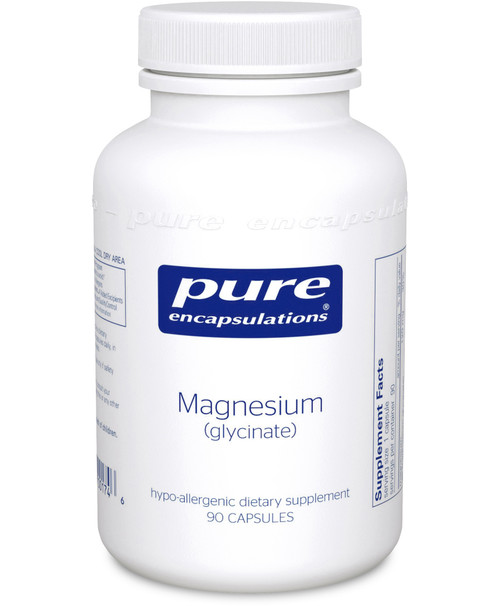
Product Description
About Magnesium (Glycinate)
Magnesium (Glycinate) is a highly bioavailable magnesium chelate that helps boost magnesium levels in people with a magnesium deficiency. Compared to other magnesium supplements, magnesium in glycinate form is much gentler to the stomach and enables the body to absorb it much easier than in any other form. The fact that it might cause significantly fewer side effects than different magnesium formulas out there makes Magnesium (Glycinate) an excellent option for people recovering from bariatric surgery.
The intake of Magnesium (Glycinate) delivers a wide range of health benefits. Among many others, it supports nerve, bone, heart, and muscle function, blood pressure, blood sugar levels, and also fosters the making of DNA, bone, and protein. The formula enables glycine to be actively transported through the intestinal wall, which is the reason why Magnesium (Glycinate) does not have a laxative effect. All that combined allows the product to deliver the maximum of its relaxing and calming effects and help treat muscle hypertonicity and chronic pain.
How Magnesium (Glycinate) Works
The high bioavailability and ingredients of Magnesium (Glycinate) allow it to provide all the aid the body needs to metabolize essential nutrients and then use them to maintain its normal functions. On top of that, Magnesium (Glycinate):
- Supports the normal functioning of multiple body processes – This involves both physiological and enzymatic functions, such as the heart function and neuromuscular contractions, and also helps maintain a balance between acid and alkaline levels in the body.
- Provides normal cardiovascular support – It covers everything from lipid metabolism and c-reactive protein metabolism to endothelial and arterial function. It can also help decrease blood pressure.
- Fosters normal bone metabolism – Being an essential mineral in the bone matrix, magnesium plays a pivotal role in the development of healthy bones. It is believed that individuals with higher magnesium levels in their system may have a higher bone density as well, which is critical in helping reduce the risk of osteoporosis and bone fractures.
- May reduce the risk of type 2 diabetes – It has been found that people with diabetes often have a magnesium deficiency. The intake of higher amounts of magnesium could help reduce the risk of developing type 2 diabetes, decrease insulin resistance, and help break down sugars.
- Lowers the frequency of migraines – Studies have shown that people who experience migraines often have low magnesium levels in their tissues and blood. Consuming magnesium can make headaches appear scarcer.
- Helps treat depression – People suffering from depression often have insufficient levels of magnesium, which affects the production of a mood-regulating hormone in the brain called serotonin.
Magnesium (glycinate) also contributes to the metabolism of macronutrients, the utilization of calcium, potassium, sodium, and phosphorus, and energy production. It should also be noted that a high intake of calcium increases the risk of cardiovascular disease, kidney stones, and arterial calcification if it is not accompanied by magnesium intake. Finally, magnesium supports the normal utilization of vitamins E, C, and B. It is also believed that magnesium could help treat premenstrual syndrome symptoms, such as mood swings, poor sleep, and anxiety, among others.
Symptoms of Magnesium Deficiency
The body requires a small amount of magnesium on a daily basis to support important functions like the heartbeat, muscle movement, and the production of hormones. However, it is critical to replenish the levels of magnesium as a means to prevent magnesium deficiency. To clarify things, low magnesium intake and magnesium deficiency are two different things. In the first case, you usually don’t experience any symptoms unless you have low magnesium levels for long periods. When that happens, it forces the kidneys to restrict the amount of magnesium the body expels through urination to retain as much magnesium as possible. That is when magnesium deficiency develops and exhibits the following symptoms:
- Fatigue
- Weakness
- Vomiting
- Nausea
- Loss of appetite
In extreme cases, magnesium deficiency can also cause:
- Abnormal heart rhythm
- Seizures
- Numbness
- Personality changes
- Muscle cramps
- Tingling
Magnesium (Glycinate) Ingredients
The formula contains 120g of magnesium (as magnesium glycinate). Other compounds include cellulose and water, which form the vegetarian capsule, and ascorbyl palmitate.
Magnesium (Glycinate) Serving Size
It is recommended to take one and up to four capsules a day with a meal, unless your healthcare professional instructs otherwise Make sure you divide the required number of capsules into several doses.
Additional Notes:
- Consult your doctor if you have kidney issues or are lactating or pregnant before taking the product.
- Speak with your healthcare provider about potential side effects.
- Magnesium (Glycinate) is only available from licensed healthcare professionals.
About the Manufacturer
Pure Encapsulations is an NSF-GMP registered nutritional supplements manufacturer that provides research-based, hypoallergenic formulas. They source premium quality, pure ingredients to ensure they create effective and safe dietary supplements that will help individuals achieve optimal health outcomes. The organization also undergoes third-party lab testing while also using the most advanced test and equipment methods so that they are certain of their products’ potency and purity.
Pure Encapsulations also owns a climate-controlled warehouse and dust, humidity, and temperature-controlled rooms, where every equipment is properly sterilized before every production run to maximize the stability and quality of the finished product.













